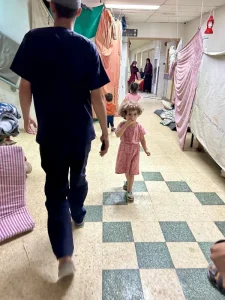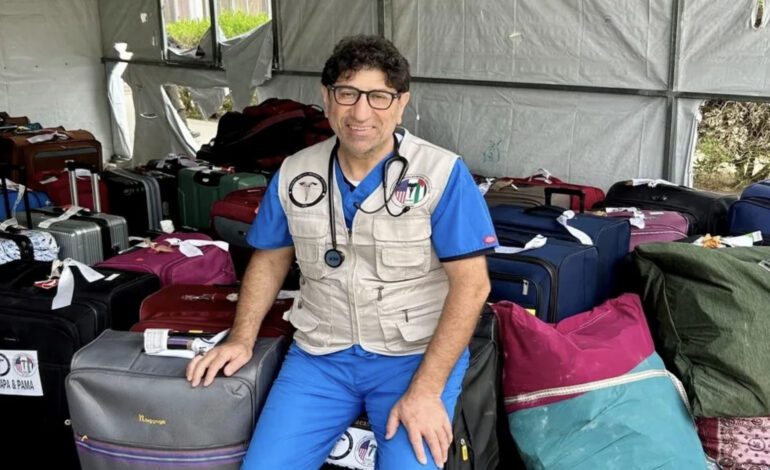A doctor from West Bloomfield is trapped in Gaza after completing a medical mission at the European Hospital in Al-Fakhari, about seven miles from Rafah.
Dr. Ammar Ghanem, a critical care and pulmonary physician and father of three, is currently stuck in a region destroyed by war. Trapped among desolation, he and an international team of nurses and doctors are in an area where an estimated 35,000 people died from injuries, disease, hunger and dehydration, according to reports.
“I’ve never seen anything like this,” Ghanem said in a Detroit Free Press report. “I’ve been on multiple missions before, but it is hard to describe until you come and see it with your eyes. You cannot imagine the amount of need and the challenges until you come here.”
In a video call with the Free Press, Ghanem was inside the hospital and said that despite the completion of their mission, he and the other workers are unable to leave. He also said there are about a dozen other U.S. doctors there.
According to Reuters, the Israeli Defense Forces seized the Rafah border crossing that connects with Egypt, so travel is blocked into and out of Gaza. While Israeli leaders said Egypt’s government is responsible for the blocked traffic across the border, Egyptian leaders fault Israel. Supplies and food cannot enter and Ghanem and the rest of the medical team cannot exit.
“There is no way to evacuate,” he said. “We have a total of 18 people — physicians and nurses” — on the mission, who also can’t leave. “The majority of us are from the U.S., but we have about four or five from Jordan who were U.S.-trained. We have one person from Australia. We have one person from Saudi Arabia.”
Ghanem is vice president of the Syrian American Medical Society, a nonprofit global medical relief organization, and said the mission was supported by the World Health Organization.
“They brought us here and they will be the ones to evacuate us,” he said. “We finished our full mission, which was two weeks, on Monday. And as of (Tuesday), we don’t have a plan.”
According to a Free Press report, the paper reached out to a WHO spokesperson who said they could not answer questions regarding the plan to help Ghanem and the crew leave Gaza.
A State Department spokesperson told the Free Press it is working toward the safe return of American medical workers, but, “the U.S. government does not control the border crossing or who is permitted to depart Gaza or enter Egypt. This remains a complex situation with serious implications for the safety and security of U.S. citizens.
“We reiterate our advice for U.S. citizens to heed our Level 4 Travel Advisory to not travel to Gaza. As a result of the armed conflict, the security environment within Gaza and on its borders is extremely dangerous and volatile.”
According to the Free Press, Ghanem said he knew the risks of embarking on the medical mission, but still wanted to help.
“I couldn’t watch it anymore,” he said. “I felt I should come and help.”
The region of the European Hospital, according to Ghanem, has become a shelter for families. Estimations of 30,000 people are sheltering there.
“It is the only functioning tertiary center that is left here in south Gaza,” he said.
“The hospital is occupied by displaced people. There’s tons of them. They occupy all the corridors, the stairs, the rooms — even taking some of the staff rooms and the offices. They are everywhere. Sometimes, we see kids inside the ICU (intensive care unit), playing. Imagine the risks that come with that kid who is 5-years-old and coming to the ICU with all the infection we have.”
Ghanem shared a photo with the Free Press that shows families walling off pieces of the hospital hallway with bedsheets in order to maintain any privacy and coverage. He also said that many of the wounded suffered severe injuries, including brain trauma, amputation of limbs, burns and various other injuries that need specific treatment and surgeries.

A photo inside the European Hospital where Dr. Ghanem and the medical team were sent to work. Photo courtesy of Dr. Ammar Ghanem.
“We have a major issue with infection control,” he said. “We had multiple surgical success stories when it comes to trauma patients, but they end up dying from infections — even young people.
“We see unusual infections that are resistant to antibiotics, gram negative bacilli, which we rarely see in the U.S. They have to use antibiotics that are very strong and have side effects. Many of these patients end up sick with multisystem failure and they die from this. These are the challenges that they face.
“A majority of people we treat are children and women. This is the other heartbreaking thing.”
Ghanem’s wife of 23 years, Amnah Allboani Ghanem, and their three children, Yaser, Zied and Haneen, await for any new information regarding Ghanem and the other medical workers from the states, according to the Detroit Free Press.
“Sometimes I break down,” Allboani Ghanem, who is a biomechanical engineer and an adjunct professor at Lawrence Technological University, told the Free Press. “And the kids feel so bad. My son sent him a message after the bombing in Rafah started. He sent him a text that said: ‘Baba, I love you so much. We are so, so proud of you. Please, please take the first opportunity to come back because I cannot imagine my life without you.’
“We are so proud of Ammar and his big heart. We miss him a lot. We are worried about his safety.”
She also said her husband bought a bag of chocolates to take with him to the hospital, according to the Free Press.
“He knew the kids would be missing that,” she said. “He is a very kind person. He is always thinking about the smallest things. He said, ‘The kids are going to love these chocolates.'”
In efforts to bring her husband and the other workers home, Allboani Ghanem and her son have been making calls to their elected officials.
“They keep telling me that it’s a very sensitive matter,” she said. “It’s a very complex matter, but they say they will try their best. They are assuring me that he’s going to be safe at the European Gaza Hospital.
“This is not calming me at all because it’s a war. Mistakes happen. We never know what’s going to happen.”






Leave a Reply